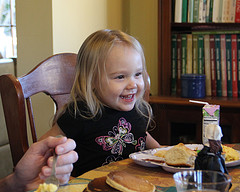If you would ask your children, “What do you remember most about Thanksgiving?” what might they sa y? Was it the food? Or, gathering together as a family? What is it that you would like for them to remember? Setting the example to have a positive, thankful attitude has been shown to give us multiple benefits in life. The model we set before our children will help them to have a grateful attitude in life.
When we take a few moments here and there to express our appreciation, we tend to feel happier, more relaxed and more optimistic. A sense of appreciation is an important part of a positive outlook and there is evidence that a positive attitude may even enhance the body’s healing system and general health.
Dr. Sam Quick, emeritus, at the University of Kentucky shares the following information with us. It’s easy to be thankful when wonderful things happen to us. That is the first level of Thanksgiving. A second level, is learning to express appreciation for the many blessings that we often take for granted–good health, adequate food and clothing, the freedom to speak our minds and help shape the future. The third and most challenging level of Thanksgiving is to maintain a positive, grateful attitude even when confronted with problems. Of course, problems and their associated painful feelings need to be faced, dealt with, and learned from. Yet, even in difficult circumstances, we can be appreciative for what didn’t go wrong and for the opportunity to learn and grow.
An appreciative attitude is a skill. It takes practice to develop it. Here are a few skill builders designed to nurture and strengthen a positive, appreciative attitude.
1. Take time to tell a close friend some of the things you admire and appreciate most about him or her.
- Enjoy a walk in a pleasant outdoor area. Focus on the beauty of nature, the sunshine, trees, streams and other miracles of your natural environment.
- Zero in on a problem you have struggled with in your life. Identify at least three positive things you have learned as a result of your experiences surrounding this problem.
- For the next several days, when a little or big problem comes up, promise yourself that you’ll make an extra effort to see the problem as a challenge and to focus on its positive aspects
- Allow yourself 10 minutes to write a spontaneous note of appreciation to a loved one, neighbor, friend or co-worker.
- In the next 24 hours, make it a point to tell each immediate family member something you appreciate about him or her.
- If you have children, when you tuck them in at night, share one positive thing they did or what you really appreciated about them today.
Because the giving and receiving of appreciation feels so good, it’s habit forming and contagious. A thankful attitude encourages physical, mental and spiritual well-being. It also promotes balanced optimism, opens our eyes to opportunities, and enhances our general well-being and effectiveness. Let every day be a celebration of Thanksgiving.
Author: Melinda Hill, Ohio State University Extension, Wayne County
Reviewed by: Shannon Carter, Ohio State University Extension, Fairfield County
References:
http://extension.psu.edu/lackawanna/news/2011/show-gratitude-on-thanksgiving-and-every-day
http://msue.anr.msu.edu/news/teaching_thankfulness_and_gratitude
Click to access Teaching_Outline_10–Gifts_of_Gratitude_and_Blessing.pdf
Click to access Facilitator_s_Guide.pdf
When I first read this, I was thinking food…. I wonder if you could ask what would you LIKE your kids to remember about Thanksgiving, or what values does your family model at Thanksgiving?


